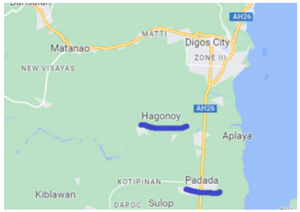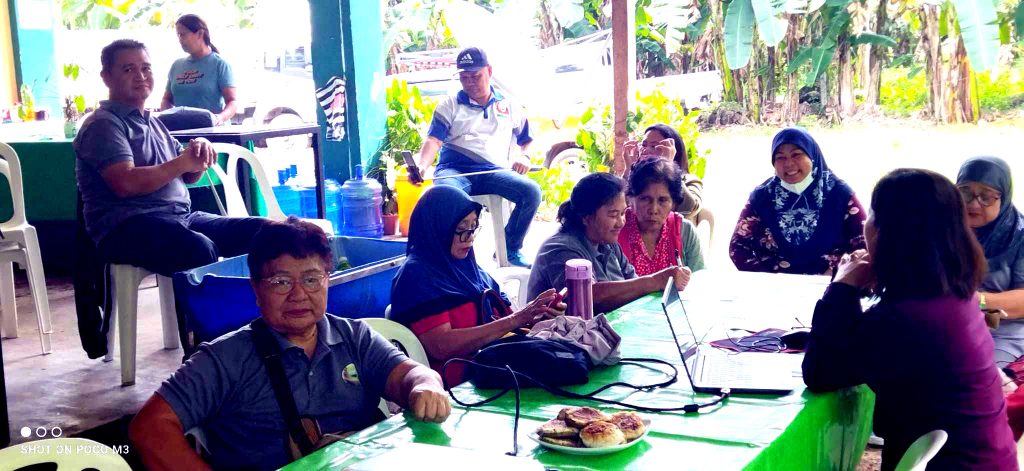The Fairtrade Farmers Credit Cooperative (FFCC) was established in 2012 with coconut farmers mostly from the towns of Padada, Sulop, Hagonoy and Malalag, all in Davao del Sur. It started out as a small group of farmers delivering organic coconuts to AG Pacific Nutriceutical Corporation—a processor of organic virgin coconut oil products.

FFCC began by providing credit to its members to finance needed inputs for their coconut farm development plans. Today, FFCC has elevated its status to a multi-purpose cooperative offering various services and organic products such as organic-certified role coconut, organic cardava (a variety of banana), copra and banana chips. In early 2022, the FFCC joined the DMDP funded IRDF- Biogrow-L3F cocohusk valorization project and ventured into the manufacturing of chips from coconut husks.
Coconut husks are considered farm waste in the Davao region and much of the Philippines. A few farmers in Davao del Sur use the husks as farm mulch. There are also enterprising farmers who sell their husks to bibingka (rice cake) stalls along the highways of Digos City and in the town of Sulop (see map above). Some coconut farmers would also sell the coco husks to fiber mills in Sta. Maria, Davao Occidental. In general, though, millions of husks are left to rot in farms during harvest time. The abandoned unused husks often clog drains and waterways.
The IRDF met FFCC at a forum hosted by the Department of Trade and Industry (DTI-Davao Del Sur) in December 2021. The IRDF had been invited by the DTI to present its new project on promoting inclusive economic growth through the valorization of coco husks, at this forum. FFCC’s interest was piqued; in the months that followed FFCC became a new and vital participant in coco husk processing.
On 20th February 2022, the FFCC received a chipping machine from BIOGROW, the commercial partner in the DMDP project and set it up in their plant in Barangay Palili, Padada, Davao Del Sur.
The first few months were a learning period for FFCC. After a few bumpy months, the FFCC has picked up a number of valuable tips for the viable business of coco chips manufacturing—lessons they are most willing to share with other cooperative producers like them.
As with many other enterprises, the first few months of coco chipping operations brought challenges to FFCC. There was machine breakdown; FFCC also had to learn to make replacement parts immediately available, like chipping blades, capacitors and fan belts. FFCC also had to deal with the high price of coco husks in the area, as they were competing with fiber mills in the nearby town of Sta Maria. There were challenges, too, to regularize operations due to the unavailability of workers. FFCC had to learn what would be an attractive wage package to secure the commitment of the workers. The unpredictability of weather conditions also hindered the regular drying of chips in Padada. There were times also that issues on the volume of coco chips delivered came into question.
Recently, however, through persistence, continuous learning and a change in management and leadership, FFCC is finding better ways to process coco husks into chips. The good news is that in June 2023, FFCC was able to produce over 400 cubic meters of wet chips— above its monthly quota. FFCC in fact plans to produce 600 cubic meters of wet chips every month with the machine they already have. The challenge for FFCC is to go into the aging and drying of its wet chips output. FFCC is aware of this and is preparing itself to go into aging and drying.
John Paul Convocar, the new FFCC general manager shared, “Effective management results in efficient working conditions, hence, contributes to more productivity.” Explaining his thoughts, he continued that people in the team should be able to understand closely their individual responsibilities and tasks, thereby contributing effectively to team goals and objectives. He was referring to both the laborers in the coco chipping plant as well as the officers of the cooperative, who are now closely working towards achieving their targets.
FFCC delivers both wet and dry chips to Biogrow almost every week. FFCC admits it needs to step up its aging and drying of wet chips. FFCC is aware it will generate better revenues and margins if it goes into cost effective aging and drying. Currently, it is targeting 600 cubic meters of wet chips per month until December 2023 and hopes to dry more chips in the coming days.
On jobs created
In the first several months of operation, they only have one shift per day. However, with the recently installed new management and leadership, the chipping plant operates on three shifts a day. This new system has generated more jobs for the processing of chips, aging and drying. Currently, they now have 13 employees, three of whom are women and one person with disabilities. Most of them were previously jobless but are now assured of a daily income. FFCC’s plan is to get more people on board in the processing of husks by acquiring more chipping machines. Additional machines mean more jobs and steady incomes. In this way, inclusive economic growth is promoted in the coco farming communities.





